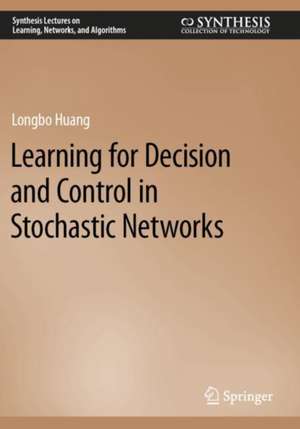Learning for Decision and Control in Stochastic Networks: Synthesis Lectures on Learning, Networks, and Algorithms
Autor Longbo Huangen Limba Engleză Paperback – 21 iun 2024
| Toate formatele și edițiile | Preț | Express |
|---|---|---|
| Paperback (1) | 302.39 lei 3-5 săpt. | +10.63 lei 4-10 zile |
| Springer International Publishing – 21 iun 2024 | 302.39 lei 3-5 săpt. | +10.63 lei 4-10 zile |
| Hardback (1) | 328.79 lei 3-5 săpt. | |
| Springer International Publishing – 20 iun 2023 | 328.79 lei 3-5 săpt. |
Din seria Synthesis Lectures on Learning, Networks, and Algorithms
- 20%
 Preț: 323.00 lei
Preț: 323.00 lei - 20%
 Preț: 638.55 lei
Preț: 638.55 lei - 20%
 Preț: 273.49 lei
Preț: 273.49 lei - 20%
 Preț: 336.95 lei
Preț: 336.95 lei - 20%
 Preț: 327.12 lei
Preț: 327.12 lei - 20%
 Preț: 357.06 lei
Preț: 357.06 lei - 20%
 Preț: 355.11 lei
Preț: 355.11 lei - 20%
 Preț: 328.09 lei
Preț: 328.09 lei - 20%
 Preț: 210.63 lei
Preț: 210.63 lei - 20%
 Preț: 273.82 lei
Preț: 273.82 lei - 20%
 Preț: 331.25 lei
Preț: 331.25 lei - 20%
 Preț: 163.23 lei
Preț: 163.23 lei - 20%
 Preț: 173.58 lei
Preț: 173.58 lei - 20%
 Preț: 199.72 lei
Preț: 199.72 lei - 20%
 Preț: 199.72 lei
Preț: 199.72 lei - 20%
 Preț: 417.11 lei
Preț: 417.11 lei - 20%
 Preț: 298.43 lei
Preț: 298.43 lei - 20%
 Preț: 199.72 lei
Preț: 199.72 lei - 20%
 Preț: 227.81 lei
Preț: 227.81 lei - 20%
 Preț: 226.14 lei
Preț: 226.14 lei - 20%
 Preț: 331.74 lei
Preț: 331.74 lei - 20%
 Preț: 163.23 lei
Preț: 163.23 lei - 20%
 Preț: 226.64 lei
Preț: 226.64 lei - 20%
 Preț: 475.02 lei
Preț: 475.02 lei - 20%
 Preț: 296.47 lei
Preț: 296.47 lei - 20%
 Preț: 314.91 lei
Preț: 314.91 lei - 20%
 Preț: 199.72 lei
Preț: 199.72 lei - 20%
 Preț: 181.10 lei
Preț: 181.10 lei - 20%
 Preț: 224.97 lei
Preț: 224.97 lei - 20%
 Preț: 243.56 lei
Preț: 243.56 lei
Preț: 302.39 lei
Preț vechi: 377.99 lei
-20% Nou
Puncte Express: 454
Preț estimativ în valută:
57.86€ • 60.57$ • 48.16£
57.86€ • 60.57$ • 48.16£
Carte disponibilă
Livrare economică 10-24 martie
Livrare express 21-27 februarie pentru 20.62 lei
Preluare comenzi: 021 569.72.76
Specificații
ISBN-13: 9783031315992
ISBN-10: 3031315995
Pagini: 71
Ilustrații: XI, 71 p. 8 illus., 7 illus. in color.
Dimensiuni: 168 x 240 x 8 mm
Greutate: 0.17 kg
Ediția:2023
Editura: Springer International Publishing
Colecția Springer
Seria Synthesis Lectures on Learning, Networks, and Algorithms
Locul publicării:Cham, Switzerland
ISBN-10: 3031315995
Pagini: 71
Ilustrații: XI, 71 p. 8 illus., 7 illus. in color.
Dimensiuni: 168 x 240 x 8 mm
Greutate: 0.17 kg
Ediția:2023
Editura: Springer International Publishing
Colecția Springer
Seria Synthesis Lectures on Learning, Networks, and Algorithms
Locul publicării:Cham, Switzerland
Cuprins
Introduction.- The Stochastic Network Model.- Network Optimization Techniques.- Learning Network Decisions.- Summary and Discussions.
Notă biografică
Longbo Huang, Ph.D. is an Associate Professor at the Institute for Interdisciplinary Information Sciences (IIIS) at Tsinghua University, Beijing, China. He received his Ph.D. in EE from the University of Southern California, and then worked as a postdoctoral researcher in the EECS dept. at University of California at Berkeley before joining IIIS. Dr. Huang previously held visiting positions at the LIDS lab at MIT, the Chinese University of Hong Kong, Bell-labs France, and Microsoft Research Asia (MSRA). He was also a visiting scientist at the Simons Institute for the Theory of Computing at UC Berkeley in Fall 2016. Dr. Huang’s research focuses on decision intelligence (AI for decisions), including deep reinforcement learning, online learning and reinforcement learning, learning-augmented network optimization, distributed optimization and machine learning.
Textul de pe ultima copertă
This book introduces the Learning-Augmented Network Optimization (LANO) paradigm, which interconnects network optimization with the emerging AI theory and algorithms and has been receiving a growing attention in network research. The authors present the topic based on a general stochastic network optimization model, and review several important theoretical tools that are widely adopted in network research, including convex optimization, the drift method, and mean-field analysis. The book then covers several popular learning-based methods, i.e., learning-augmented drift, multi-armed bandit and reinforcement learning, along with applications in networks where the techniques have been successfully applied. The authors also provide a discussion on potential future directions and challenges.
Caracteristici
Introduces Learning-Augmented Network Optimization based on a general stochastic network optimization model Covers key theoretical tools for network research, as well as popular learning-based methods and their applications Discusses potential future directions and challenges related to Learning-Augmented Network Optimization
